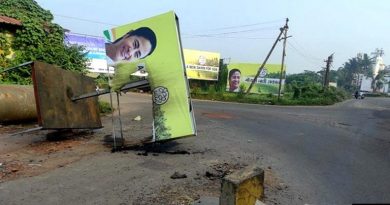| |
|---|
News Desk: The SIT constituted by the Uttar Pradesh government finally submitted its report on the Vikas Dubey episode of Kanpur.

If newspaper reports are to be believed, no fewer than 80 government servants of various seniority and ranking were willing accomplices of the slain criminal Vikas Dubey in his various depredations — whether it was the surreptitious acquisition of licences of firearms, through political manipulations or bribery, or both; whether it was forcible possession of expensive plots and buildings or getting easy acquittals in the 70 odd offences, for which he was charged. It is an extremely disturbing situation where senior officers are also allegedly involved in giving him protection for caste, economic and political reasons.
Of course, the larger question is that this systemic failure did not happen in a day; it is a cumulative failure of the entire administrative machinery. How could firearm licences be recommended and granted to Vikas Dubey when he had a criminal history running into dozens of heinous cases? All the complicit officers, starting from the police outpost in-charge, Station House Officer, the DSP, the Additional SP, the Senior Superintendent of Police and the District Magistrate who finally sanctioned the arms licences need to explain their conduct and compulsions as to the reasons why these firearms licences were recommended and sanctioned.
Not a single criminal case against Vikas Dubey was vigorously pursued to ensure his conviction. For this serious lapse, investigators and those who supervised the investigations, which in the present case would go up to the level of Superintendent of Police and even higher, need to answer the en masse acquittals. Those responsible for effective prosecution also failed miserably as their cases fell flat in courts. All these officers should be held accountable for the mass acquittals and the liberal bails granted.
All assets, movable and immovable, usurped by Vikas Dubey must be immediately identified, especially those that are benami. These must be confiscated and either auctioned or utilised for public purposes. Those government servants who benefited from these transactions must be treated as gang members of Vikas Dubey and exemplary action be taken against them expeditiously. This orgy of crime, violence, extortion and loot had a free run for no fewer than two decades plus — this is a terrible reflection on the existing criminal justice system and loose administrative machinery facilitating crime syndicates. It is not just the case of one Vikas Dubey; there could be dozens of Vikas Dubeys in the shadows, who may have used this ‘effective’ modus operandi to run and promote their empires of crime.
Obviously, the internal vigilance mechanism of all departments found complicit, namely the police and the magistracy, also failed the people when they turned a Nelson’s eye to the first abnormal fault lines of illegality. This is impossible without the connivance at crucial levels of administration. There are disconcerting reports also of the involvement of the very highest officials. In the light of these sensational disclosures, it is expected that the least that the Government and Vigilance department could do is to nail all those found complicit in this shameful saga.
Under the present circumstances, the Government must take exemplary punitive action and corrective measures against all those who are charged with providing illegitimate assistance to Vikas Dubey, because nothing less than dismissal would meet the ends of justice. The provisions of Article 311(3), of the Constitution of India, are meant to deal with deviant government servants and summary dismissal is possible under these provisions. Sadly, this has not happened in the past, which has greatly emboldened the corrupt and the inefficient, at great public cost.
There was a time when a senior IPS officer, returning from Japan after training, was dismissed from service because he did not pay the customs duty of the camera that he had purchased in Japan! An ICS.officer was made to resign because of an inadvertent extra claim of 25 paise in his travelling allowance bill. But these are unbelievable things of the past and nothing shocks and surprises us any longer. The NN Vohra Committee in its report in October 1993 explained in great detail the deep and criminal nexus among the politicians, criminals, bureaucrats and the police. Expectedly, this report is eating dust since then and not surprisingly little action has been taken against any of these four constituents of institutionalized corruption. To the contrary, the number of corruption cases registered has also decreased over the years. So are we really to believe that the corruption level has gone down? Nothing would be more absurd than to give credence to this conjecture; it must be analysed as to why there is a decline in the registration of corruption cases.
It is not just the matter of just one Vikas Dubey, it is the matter of innumerable Vikas Dubes mushrooming in every block, tahsil and subdivision, to grow into huge banyan trees of corruption and organised crime over a period of time, with the blessings of corrupt politicians, corrupt bureaucrats and an eroded and compromised police system too.
It will not serve the interest of justice to merely penalise the lower functionaries and the middle-level officers. The senior-most in the IAS and IPS and politicians must be held accountable for the open loot of public and private assets.
Not to do this would give conflicting signals that there are a separate set of rules for the higher officers and different set of rules for the lower functionaries
There are extremely important lessons that should be drawn from this horrible administrative failure. The internal vigilance needs to be tightened to a level that any officer displaying abnormal characteristics of living beyond his means must be immediately identified and charged with corrupt practices; those found aiding and abetting crime syndicates should be dealt with administratively and legally, depending upon the seriousness of the charges. Prompt punishment must be awarded within 180 days without inexplicable delays.
The documentation of criminals of every category must be standardised, with due care, attention and application of mind. Inspections must be conducted regularly by senior officers, all adverse observations of inspecting officers must be carefully numbered and documented, so that faithful compliance is possible on quantifiable parameters duly monitored by the Police Headquarters and the DGP Office, a practice that has lapsed into disuse. Vikas Dubey would not have become a Frankenstein’s monster, but for the internal lapses of the police, prosecution, administration and a symbiotic lifeline provided by corrupt politicians. The senior officers of all services are expected to provide mature leadership to their junior colleagues to uphold the highest traditions of public service, unimpeachable integrity and zero tolerance to brazen mafia depredations so that the likes of Vikas Dubey are not just nipped in the bud but crushed in their germinating stage itself.




